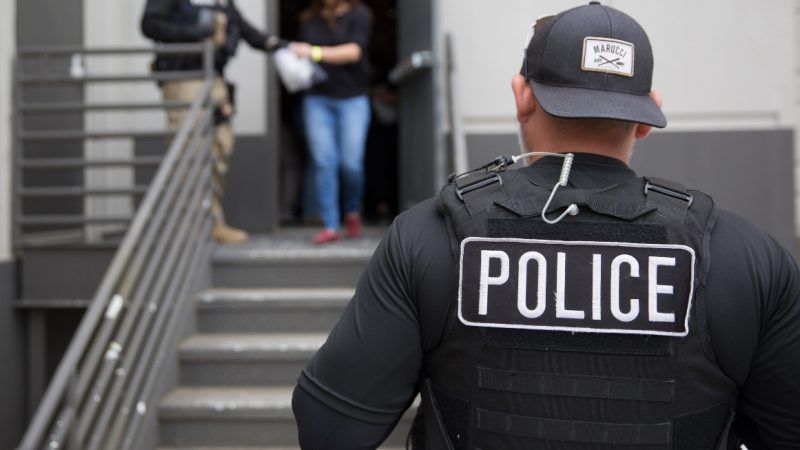His Wife Was Killed in Afghanistan. Then ICE Showed Up To Deport Him.
He's back in the U.S., though he's not out of the woods yet.

An undocumented immigrant and military widower whose wife was killed in Afghanistan in 2010 was deported to Mexico last week by Immigration and Customs Enforcement (ICE). Jose Arturo Gonzalez Carranza, who has a 12-year-old daughter, is now back in the U.S., though the reversal appears to have been an effort to avoid bad press.
The Arizona Republic was the first outlet to report the story. Gonzalez Carranza, 30, who entered the U.S. illegally in 2004, married Barbara Vieyra in 2007. Vieyra had always wanted to be in U.S. Army, and she joined up in 2008, not long after the birth of their daughter Evelyn, as detailed in a 2018 East Valley Tribune story.
Vieyra became a military police officer and was deployed to Afghanistan. Then, in September 2010, the military vehicle she was in was attacked by insurgents, sustaining improvised explosive device (IED) and rocket-propelled grenade (RPG) damage. Vieyra was killed, leaving her husband and daughter, among other family members, behind.
Gonzalez Carranza, meanwhile, was granted a parole in place exemption, his attorney, Ezequiel Hernandez, told the Republic. According to the U.S. Citizenship and Immigration Services (USCIS) website, individuals who might otherwise be deported "may be eligible for parole in place in 1-year increments if you are the spouse, widow(er), parent, son or daughter of" a current, former, or deceased member of the military.
Then, on the morning of April 8, while Gonzalez Carranza was driving to work, ICE agents accosted him with their guns drawn. "Put your hands up. Open the door," he recalled them saying. Gonzalez Carranza told the Republic he responded: "Who you guys are? I have rights." It didn't matter. He was taken into custody and eventually deported to Nogales, Mexico.
So why did ICE come for Gonzalez Carranza, despite his parole in place exemption? At this point, there's no clear answer. ICE appears to have refiled its case against him last year, according to Hernandez, even though he has no criminal record. Gonzalez Carranza was supposed to appear in court on December, but didn't because the notice regarding his hearing was sent to an old address.
"We have evidence it went to the wrong address," Hernandez told The Washington Post. "There were little errors throughout this case."
"The government never revoked the [parole-in-place]," he added to CNN. They detained [Carranza] because of the order of removal done due to the court hearing my client did not go to because he did not know. As of today, we do not know why the client was removed."
Even though Gonzalez Carranza didn't show up for his court date, he should not have been deported. Per the Republic:
Hernandez said he filed a motion to reopen Gonzalez Carranza's deportation case. The motion triggered an automatic stay of removal, but ICE deported him anyway, Hernandez said.
[American Civil Liberties Union deputy legal director Cecillia] Wang also said it Gonzalez Carranza should not have been deported if there was a stay of removal. She said, however, it is "not uncommon" for ICE to violate stays of removal.
In any case, Hernandez said that after sending a press release to the media and speaking with the Republic, ICE notified him of their reversal. On Monday afternoon, Gonzalez Carranza was taken back to the U.S.
Arizona Democratic Sen. Kyrsten Sinema may have had something to do with Gonzalez Carranza's return as well. Her "office is in communication with Mr. Carranza's attorney and we will assist the Carranza family in this process," Sinema told CNN.
Gonzalez Carranza isn't out of the woods yet. He needs an immigration judge to reopen the case so he can apply once again for the parole in place exemption. His daughter, meanwhile, who lives with her grandparents, didn't even know her father was deported. "I didn't tell her nothing," Gonzalez Carranza told the Republic. "I don't want to make her feel [worse], her feelings be more frustrated, like I don't have a mom, and now I may never see my dad again."
Gonzalez Carranza's case is certainly sad. Unfortunately, he might not be alone. Last July, the Military Times reported that the Trump administration was rejecting a greater number of veterans' requests for deportation exemptions for their family members:
The data shows that rejections of veteran requests have increased under President Donald Trump, from about a 10 percent rejection rate in fiscal 2016, the last year President Barack Obama was in office, to an almost 20 percent rejection rate through the first nine months of fiscal 2018. Specifically:
In fiscal 2016, the Obama administration denied 140 veteran requests for deportation protection and approved 1,304 requests.
In fiscal 2017, the Trump administration denied 250 veteran requests for deportation protection and approved 1,449 requests.
It's undoubtedly a good thing that Gonzalez Carranza will most likely be able to stay in the U.S. What's unfortunate is that there are many people in similar situations whose cases will not garner national outrage. ICE has a history of mismanagement and allegations of misconduct, and as Reason's Zuri Davis wrote in January, these issues will continue without more oversight.
For more Reason coverage of ICE, click here.


Show Comments (97)